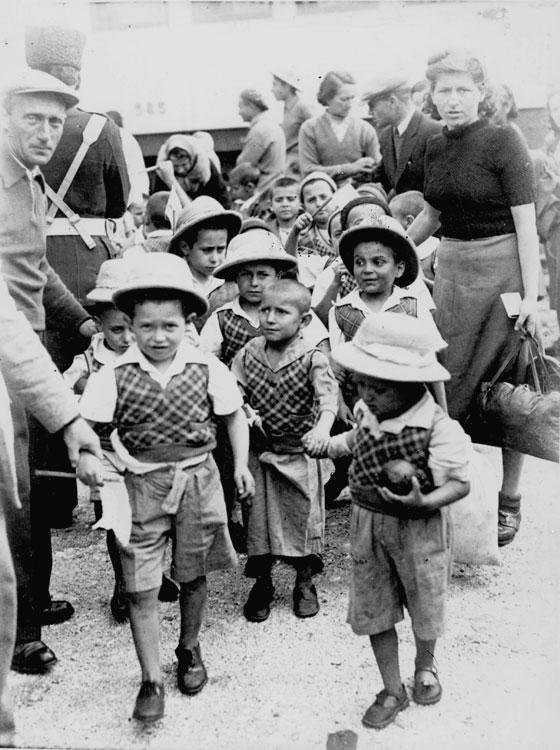In September 1939, with the Nazi German invasion of Poland, some 300,000 Polish Jews fled for the Soviet Union. Thousands died on this journey, leaving their children orphaned. In 1942, 1,800 Jewish refugees were brought to Tehran, including approximately 1000 children, most of whom were orphans. In February 1943, these children and their escorts reached Eretz Israel (Mandatory Palestine).
At the outbreak of World War II, some 300,000 Jews left Poland and fled eastwards, into the Soviet Union. Some migrated to Siberia, while others reached the Soviet republics in Central Asia. Thousands of children lost their parents in the course of this arduous journey. These children described the days of the German invasion and the flight eastward:
"On Shabbat, 2 September, Father returned from synagogue very agitated, and said that it appeared that the Germans were coming. Mother left everything on the oven, and packed. She gave my brother Meir, who was then 12, a small suitcase, and she gave me one package. All the Jews fled… except for some old people who were not able to travel. The route was packed with pedestrians carrying bundles on their shoulders, and with wagons and cars… the next day, Father rented a wagon for a large sum of money, but after a few hours' traveling, the farmer decided not to continue, and told us to disembark. Father begged him to have mercy on the children, Mother wept, but nothing helped; the farmer pushed us out of the wagon and continued on his way. Father didn't have the strength to carry the bedlinen, and he threw it by the wayside, and Mother jettisoned her suitcase. Thus we arrived in Rzhezhov, and the next day we boarded a train for Jarowslaw…"
" …On Saturday night, we boarded a wagon with Grandpa and Grandma, uncles and aunts and their children, 11 people in total. The way forward was blocked with carts, broken down cars and dead horses. The unheeded wails of the wounded could be heard on all sides. German planes swooped low and strafed people. We hid in ditches."
"…The Germans ordered all the Jews to leave the town, and announced that every Jew found there after six in the evening would be shot immediately. We hurried to gather our belongings and we fled the town."
On the loss of their family members:
"They sat me in a wagon, and Mother ran behind us. At night, the wagon took a turn to the side, and in the morning, I realized that I was all alone."
"Father and Mother came down with dysentery. We sold our last shirts to hire a wagon and to bring them to the hospital, but there they refused to take them in. All our pleading was in vain, and we had to return them home, sick. They lay in the hut for two weeks, and grew sicker by the day… Father died on Shabbat, and Mother four days later. We were left alone, my little sisters and I. I couldn't support them on my wages, we had nothing left to sell, and the three of us starved…"
"I didn't want to leave Father, but I understood that I was a burden to him. Before I left, I gave him my clothes and blankets. At the moment of parting, we both cried a lot, and Father told me to be a good Jew, and to never forget him."
"I watched Mother die, and then Father. Both of them starved to death. We were seven brothers and sisters, and only I survived."
(Excerpts from The Children of Zion – the Path of Agony of the “Tehran Children” by Henryk Grynberg, published in Hebrew by Yad Vashem in 1995)
In 1942 an agreement was signed between the Polish Government-in-Exile and the Soviet government, authorizing the emigration of some 24,000 Polish soldiers and refugees from Soviet soil. From April to August 1942, the refugees were brought via the Caspian Sea to Tehran, which was under British rule. Amongst the refugees were some 1,000 Jewish children, mostly orphans, and 800 Jewish adults. Once in Tehran, the adults established an orphanage with the active aid of the Jewish community and Jewish Agency emissaries from Eretz Israel (Mandatory Palestine). One of the orphanage directors was Zipporah Shertok, wife of Moshe Shertok (later Israeli Prime Minister Moshe Sharett). The orphanage was run under conditions of extreme deprivation, particularly of food, with constant endeavors being made to retrieve children from priests and nuns.
The emissaries obtained immigration permits and a ship. In January 1943, the Jewish children and their escorts sailed to Karachi, Pakistan, and from there to Suez, reaching Eretz Israel by train on 18 February 1943. Over 700 of the children were orphans; less than 150 of them were with either one or both parents.
From the moment the children left Tehran, their journey evoked great excitement in the Yishuv. All along the train's route in Eretz Israel, until its arrival at Atlit, the passengers were greeted by thousands of wellwishers. Members of the Youth Aliyah helped with the children's absorption, initially at Atlit, and later in 11 transit camps, in which the children recovered and recuperated after three years of wandering and suffering. Many of them suffered from ailments, nightmares and post-trauma. Several used to hide food as a result of the shortages they had experienced during their travels.
The "Tehran Children" as they were known in Israel, were the largest group of survivors to arrive in Eretz Israel during the war years.
Some of the Tehran Children managed to keep dolls, diaries and other personal items with them throughout their wanderings, some of which are displayed in the online exhibition: "Bearing Witness – Stories behind the Artifacts in the Yad Vashem Museum Collection".
Yad Vashem Photo Archives, 4892/82

